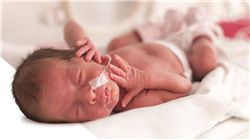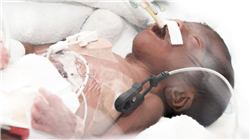University certificate
The world's largest faculty of medicine”
Introduction to the Program
With this 100% online Postgraduate diploma, you will delve into the initial evaluation of critically ill neonatal patients, the management of ventilation and hemodynamics, and the treatment of complex medical conditions"

Neonatal Intensive Care Units (NICUs) are an essential part of medical care for newborns who are premature or have complicated medical conditions. As such, highly skilled multidisciplinary teams work tirelessly to provide specialized, personalized care for these patients. With constant technological advances, from high-frequency ventilators to advanced vital signs monitoring, NICUs are better equipped than ever.
Thus was born this Postgraduate diploma that will delve into the fundamental principles of Pediatric Intensive Care, highlighting ethics and evidence-based decision making. In this sense, professionals will be able to perform a meticulous initial assessment of critically ill pediatric patients, identifying life-threatening signs and prioritizing care. In addition, they will acquire advanced knowledge of hemodynamics to optimize cardiovascular support, as well as skills to select and administer critical drugs with a full understanding of their pharmacokinetics and pharmacodynamics.
Likewise, the agenda will focus on Neonatal Intensive Care, addressing monitoring techniques, respiratory support strategies, both invasive and non-invasive, and the comprehensive management of nutrition in pathological newborns, as well as in premature infants. Likewise, physicians will cover the specific challenges of Neonatology and apply appropriate interventions to ensure the well-being of neonates.
Finally, advanced aspects of Neonatal Intensive Care will be examined, including the pathophysiology of Hyaline Membrane Disease and Persistent Pulmonary Hypertension, as well as the management of Neonatal Sepsis and Neurological Disorders. Specialized skills will also be obtained for the care of extremely premature neonates and those with Congenital Heart Disease.
In this situation, TECH has developed a comprehensive program completely online, adapted to the individual needs of the student body, eliminating inconveniences such as the need to travel to a physical center or to the hospital. In addition, it is based on the innovative Relearning methodology, which focuses on repetition of key concepts to ensure optimal assimilation of the contents.
You will develop interdisciplinary and communication skills to collaborate effectively in multidisciplinary health care teams improving outcomes for the most vulnerable neonates"
This Postgraduate diploma in Neonatal Intensive Care contains the most complete and up-to-date scientific program on the market. The most important features include:
- The development of case studies presented by experts in Neonatal Intensive Care
- The graphic, schematic and eminently practical contents with which it is conceived gather scientific and practical information on those disciplines that are indispensable for professional practice
- Practical exercises where the self-assessment process can be carried out to improve learning
- Its special emphasis on innovative methodologies
- Theoretical lessons, questions to the expert, debate forums on controversial topics, and individual reflection assignments
- Content that is accessible from any fixed or portable device with an Internet connection
You will identify and effectively treat common complications in Neonatology, such as Neonatal Sepsis, Congenital Heart Disease and Neurological Disorders. What are you waiting for to enroll?"
The program’s teaching staff includes professionals from the field who contribute their work experience to this educational program, as well as renowned specialists from leading societies and prestigious universities.
The multimedia content, developed with the latest educational technology, will provide the professional with situated and contextual learning, i.e., a simulated environment that will provide immersive education programmed to learn in real situations.
This program is designed around Problem-Based Learning, whereby the professional must try to solve the different professional practice situations that arise during the course. For this purpose, students will be assisted by an innovative interactive video system created by renowned and experienced experts.
You will acquire advanced knowledge in hemodynamics to optimize cardiovascular support, as well as skills to select and administer critical drugs. With all TECH’s quality guarantees!"

You will master specific monitoring techniques for neonates, as well as strategies for respiratory support, both invasive and non-invasive, thanks to an extensive library of multimedia resources"
Why study at TECH?
TECH is the world’s largest online university. With an impressive catalog of more than 14,000 university programs available in 11 languages, it is positioned as a leader in employability, with a 99% job placement rate. In addition, it relies on an enormous faculty of more than 6,000 professors of the highest international renown.

Study at the world's largest online university and guarantee your professional success. The future starts at TECH”
The world’s best online university according to FORBES
The prestigious Forbes magazine, specialized in business and finance, has highlighted TECH as “the world's best online university” This is what they have recently stated in an article in their digital edition in which they echo the success story of this institution, “thanks to the academic offer it provides, the selection of its teaching staff, and an innovative learning method aimed at educating the professionals of the future”
A revolutionary study method, a cutting-edge faculty and a practical focus: the key to TECH's success.
The most complete study plans on the university scene
TECH offers the most complete study plans on the university scene, with syllabuses that cover fundamental concepts and, at the same time, the main scientific advances in their specific scientific areas. In addition, these programs are continuously being updated to guarantee students the academic vanguard and the most in-demand professional skills. In this way, the university's qualifications provide its graduates with a significant advantage to propel their careers to success.
TECH offers the most comprehensive and intensive study plans on the current university scene.
A world-class teaching staff
TECH's teaching staff is made up of more than 6,000 professors with the highest international recognition. Professors, researchers and top executives of multinational companies, including Isaiah Covington, performance coach of the Boston Celtics; Magda Romanska, principal investigator at Harvard MetaLAB; Ignacio Wistumba, chairman of the department of translational molecular pathology at MD Anderson Cancer Center; and D.W. Pine, creative director of TIME magazine, among others.
Internationally renowned experts, specialized in different branches of Health, Technology, Communication and Business, form part of the TECH faculty.
A unique learning method
TECH is the first university to use Relearning in all its programs. It is the best online learning methodology, accredited with international teaching quality certifications, provided by prestigious educational agencies. In addition, this disruptive educational model is complemented with the “Case Method”, thereby setting up a unique online teaching strategy. Innovative teaching resources are also implemented, including detailed videos, infographics and interactive summaries.
TECH combines Relearning and the Case Method in all its university programs to guarantee excellent theoretical and practical learning, studying whenever and wherever you want.
The world's largest online university
TECH is the world’s largest online university. We are the largest educational institution, with the best and widest online educational catalog, one hundred percent online and covering the vast majority of areas of knowledge. We offer a large selection of our own degrees and accredited online undergraduate and postgraduate degrees. In total, more than 14,000 university degrees, in eleven different languages, make us the largest educational largest in the world.
TECH has the world's most extensive catalog of academic and official programs, available in more than 11 languages.
Google Premier Partner
The American technology giant has awarded TECH the Google Google Premier Partner badge. This award, which is only available to 3% of the world's companies, highlights the efficient, flexible and tailored experience that this university provides to students. The recognition as a Google Premier Partner not only accredits the maximum rigor, performance and investment in TECH's digital infrastructures, but also places this university as one of the world's leading technology companies.
Google has positioned TECH in the top 3% of the world's most important technology companies by awarding it its Google Premier Partner badge.
The official online university of the NBA
TECH is the official online university of the NBA. Thanks to our agreement with the biggest league in basketball, we offer our students exclusive university programs, as well as a wide variety of educational resources focused on the business of the league and other areas of the sports industry. Each program is made up of a uniquely designed syllabus and features exceptional guest hosts: professionals with a distinguished sports background who will offer their expertise on the most relevant topics.
TECH has been selected by the NBA, the world's top basketball league, as its official online university.
The top-rated university by its students
Students have positioned TECH as the world's top-rated university on the main review websites, with a highest rating of 4.9 out of 5, obtained from more than 1,000 reviews. These results consolidate TECH as the benchmark university institution at an international level, reflecting the excellence and positive impact of its educational model.” reflecting the excellence and positive impact of its educational model.”
TECH is the world’s top-rated university by its students.
Leaders in employability
TECH has managed to become the leading university in employability. 99% of its students obtain jobs in the academic field they have studied, within one year of completing any of the university's programs. A similar number achieve immediate career enhancement. All this thanks to a study methodology that bases its effectiveness on the acquisition of practical skills, which are absolutely necessary for professional development.
99% of TECH graduates find a job within a year of completing their studies.
Postgraduate Diploma in Neonatal Intensive Care
Are you passionate about newborn care and want to specialize in a crucial area of medicine? You've come to the right place. At TECH Global University you will find a complete postgraduate diploma that will help you achieve your academic goals. This course, taught 100% online, will provide you with advanced and specific training in neonatal intensive care, preparing you to face the most complex challenges in neonatal intensive care units. Our syllabus is developed by experts in neonatology, ensuring that you receive the latest and most relevant information in the field. In addition, you will have the opportunity to learn from leading professionals in the field of neonatology, who will share their experience and knowledge with you. Thanks to this, you will develop skills for the evaluation and monitoring of critically ill newborns. This will enable you to implement advanced life support and neonatal emergency management strategies.
Get your degree with a Postgraduate Diploma in Neonatal Intensive Care
The current labor market requires professionals, in different areas of knowledge, to specialize in order to respond correctly to the challenges of the labor market, therefore, in TECH we have strived to structure high quality content, which can provide the necessary knowledge so that you can stand out in your jobs. In our high quality postgraduate course, the thematic axes will guide you correctly so that at the end you will be able to handle everything related to neonatal intensive care. On the other hand, throughout the course you will face a series of practical exercises that will be fundamental to internalize the concepts taught in each lesson, preparing you for the possible challenges that you will face during your work practice. At the end of the training, you will be able to foster teamwork and effective communication within neonatal intensive care units. In addition, you will manage and apply the latest technologies and techniques in neonatal intensive care. In short, this program is your opportunity to make a difference in the lives of the most vulnerable newborns. With quality, flexible and accessible training, you will be prepared to face the greatest challenges in neonatal intensive care. Enroll now and be part of the change!







